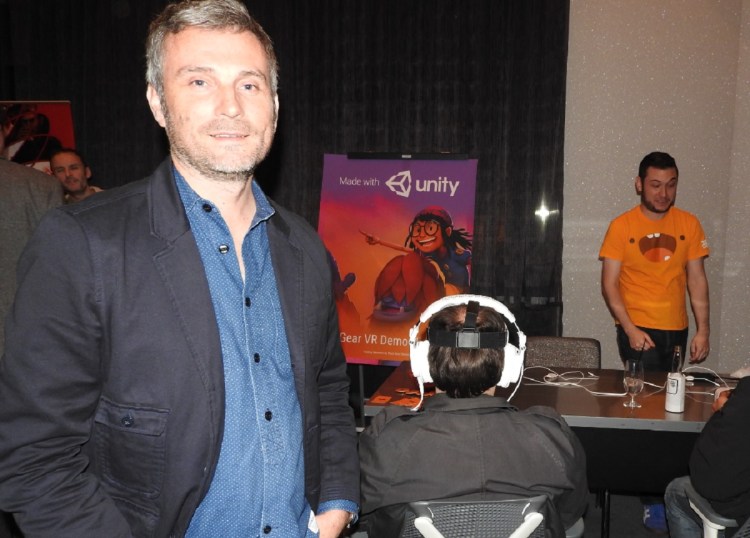GamesBeat: I like this one, Climax Studios‘ Bandit Six Salvo game.
Downie: It’s a simple arcade shooter that’s done really well. It puts you in the space. The important thing to realize about Unity and about VR is about the applications that are non-game, though. We have Speech Center VR. It’s not necessarily a game, though it has gamification elements in it. Unity is also being used in training devices for a broad range of categories and markets.
GamesBeat: Do you know how much of the Unity developer base is moving over to VR?
Downie: I don’t have exact numbers, but in general we see great interest. You see the pioneers and you see people who may follow later. For this event, it was hard to go into the large number of games made with Unity and cut it down to 11. This event could have been a lot bigger. They could have numbered in the hundreds.
We’re hosting a vision conference in L.A. in early February. That’s where we’re bringing all the parties in VR and AR together in one place. It’s a summit for VR. We’ll talk about best practices, talk about where it’s going on a consumer level and a technology level and a crafting level. We’ve had close to 300 submissions, in the first week, for our awards at that event. That’s a good indication of the scale of projects that are available right now, at a quality level that people want to put up in competition.
GamesBeat: The sense I get is that there are large communities in Seattle, the Bay Area, and Los Angeles. New York is pretty big too. Do you feel like all the major game development areas are getting into it?
Downie: My impression is that VR is being made in every corner of the world. We see it in Europe. We see it in Asia. We see it in North and South America.
GamesBeat: Is it almost a mirror of mobile game development?
Downie: It’s a slightly different as far as the form and function and complexity to it. It certainly doesn’t mirror the size of mobile. It could well in the future. Certainly Gear VR is a product that could get to that. But it’s early days.
GamesBeat: I’m always trying to figure out what’s the strongest region in games now, in terms of quality and revenue and jobs. Montreal has 10,000 jobs in games now. I interviewed a company that’s in Israel now, but the staff are all from Siberia. If Siberians can build a 100-person game company….
Downie: Did you see with Made With Unity videos we did? The guys who are making Vein, they’re six western developers working out of Tokyo. There are no borders now. That’s special. Something like Unity allows that to happen. When you have a uniform tool set, wherever you are in the world, that means you can move anywhere in the world and continue working, continue crafting. You don’t have to worry about dropping in at a new studio and learning new tools and new engine dynamics. We’re proud of this notion that Unity allows job creation.
GamesBeat: We wrote about a seed investment fund that’s focused entirely on VR, Presence Capital. A couple of others seem to be forming.
Downie: There’s one down the street, actually. They come in and see us. They’re looking, rightly, for our perspective on where the leading edges are for creativity, what we see people using our tools for. There’s a lot of investment going on.
GamesBeat: Did you guys start in L.A. for a reason with your VR series of events?
Downie: It’s a good intersection of all the forms of entertainment. It’s a creative center. It transcends games or movies or TV or other forms. You have creators like Alex McDowell, who was the design director on Minority Report and Fight Club. He runs a VR studio now using Unity. He’s based there, pioneering new 3D worlds. And you have game companies in and around the city as well.
GamesBeat: I saw that Ubisoft is jumping in with their first VR game. Do you feel like the big guys are in motion yet? I don’t know if they’d use Unity or use their own engines.
Downie: It varies. Unity is great for prototyping. We see it being used for prototypes at many big shops, as well as for mainline games. My sense is that most of the big companies are either prototyping or they’re in wait-and-see mode. I don’t think anyone is saying they’re not going to do it. It’s undeniably a version of future entertainment consumption. That’s a consensus.
GamesBeat: I know you guys see everything. Do you notice a continuing increase in the number of developers out there? Do you see any pull-back or consolidation among indies?
Downie: We see our monthly active users, developers using Unity, increase. We see the number of games launched per month increase. We see the number of downloads of games increase. We’re at 1.2 billion downloads a month for games powered by Unity. It’s not just focused on specific parts of the world, too. It’s a genuinely global base. We have strong growth in Russia and in China. The short answer is, yes, we see growth in developers. That’s in the made-with-Unity ecosystem.
The challenge to that is that discovery still sucks. We’re trying to do some things about that. It starts with increasing the discoverability of made-with-Unity products. The start of that is events like this. Another example is our website destination, which now has a very healthy six-figure MAU base and growing.
VentureBeat's mission is to be a digital town square for technical decision-makers to gain knowledge about transformative enterprise technology and transact. Learn More




